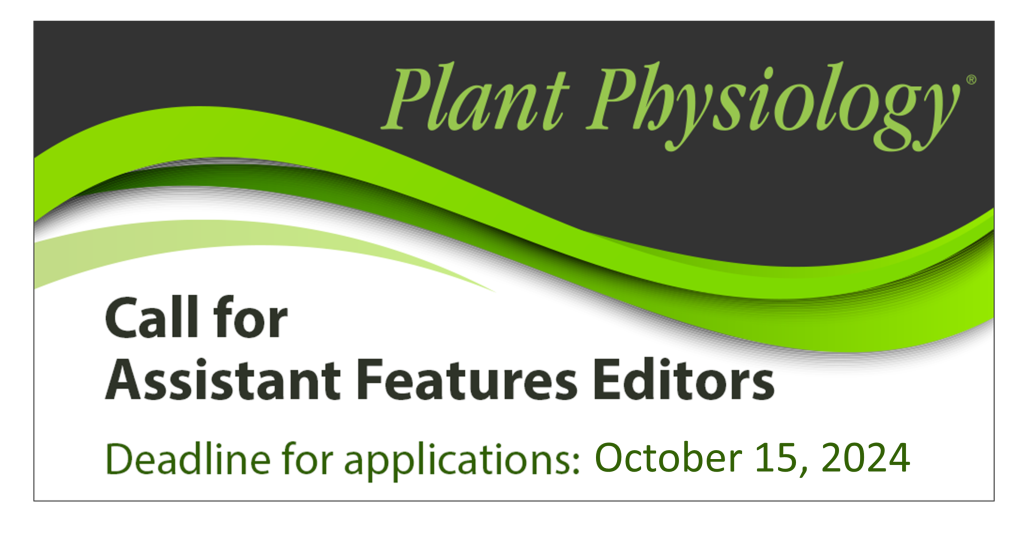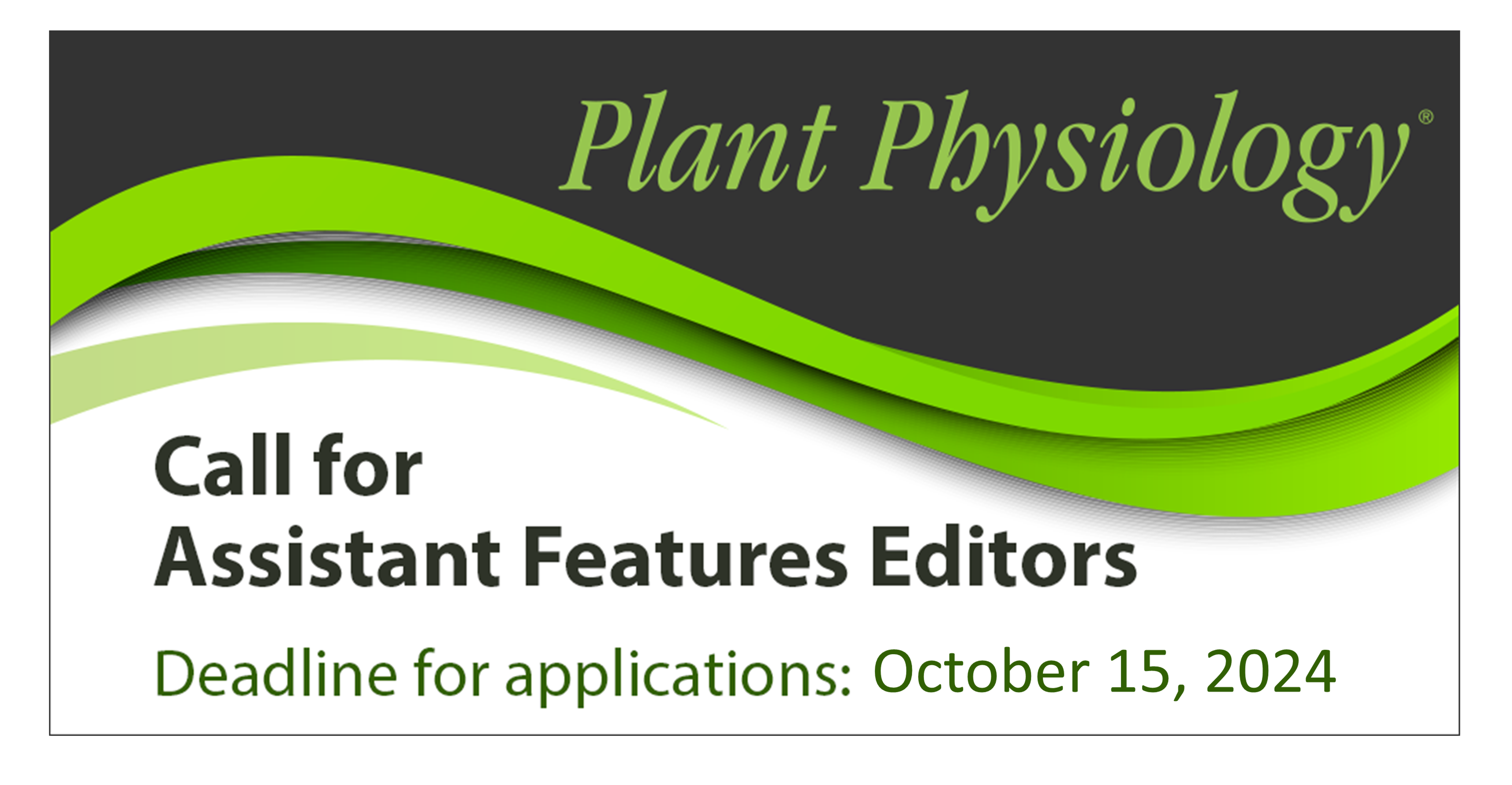The application period is now closed! Thank you to all who applied. Come back next summer to learn how to apply to the Plant Cell Assistant Features Editor program!
By Yunde Zhao (Plant Physiology EIC) and Mary Williams (Plant Physiology Features Editor)
 We started the Plant Physiology Assistant Features Editor program more than six years ago to help young scientists to advance their career and help disseminate exciting discoveries published in Plant Physiology. Since then, more than 100 early-career career scientists, mostly postdocs but also some advanced graduate students, have served as Assistant Features Editors (AFEs).
We started the Plant Physiology Assistant Features Editor program more than six years ago to help young scientists to advance their career and help disseminate exciting discoveries published in Plant Physiology. Since then, more than 100 early-career career scientists, mostly postdocs but also some advanced graduate students, have served as Assistant Features Editors (AFEs).
This past January, Plant Physiology welcomed 15 new AFEs to the editorial board. Together with the AFEs recruited in 2023, these young scientists have brought their passion for science to the journal, communicating to our readers some of the most exciting Plant Physiology papers through News and Views articles. Some examples of News and Views written by AFEs can be found here https://academic.oup.com/plphys/issue#1873624-7517351.
Our AFE program greatly advances young scientists’ careers; in fact, of those who have completed the program and moved into their next roles, the majority have secured tenure-track positions. Plant Physiology AFEs receive professional advice on scientific writing from our seasoned editors and the AFEs have abundant opportunities to network with our regular editors. For example, AFEs conduct informal interviews with Plant Physiology editorial board members, enabling the AFEs and Plant Physiology readers to get to know our editors (see https://plantae.org/research/plant-physiology/#editor-profiles). AFEs are invited to the Plant Physiology editorial board meetings, and for the in-person meeting their travel expenses are covered by the journal. At the editorial board meeting, the AFEs not only can interact with and learn from senior scientists, but also contribute to discussions on journal policies and operation.
One of our AFEs recently shared, “I really enjoy writing N&V and can already see improvement in my writing style!” and another wrote, “The editorial meeting last year was great. It was very interesting to learn about topics of concern for this journal and hear the discussions to try and mitigate them. The AFE program is amazing and I am very grateful to be part of it.”
In the spirit of cooperation, Plant Physiology and Plant Cell are now recruiting AFEs in alternating years; this year Plant Physiology is recruiting AFEs to start in 2025 and 2026, and next year Plant Cell will recruit AFEs to start in 2026 and 2027. Therefore, we are currently recruiting two cohorts of AFEs to start in either January 2025 or January 2026. Each new cohort will work with the journal for 24 months.
If you are interested in becoming an Assistant Features Editor, we are welcoming applications through Tuesday, October 15, 2024.
We are interested in hearing about your current position and future goals and why you are interested in the position. We will need your Curriculum Vitae and the contact details of two individuals familiar with your work as a researcher. We will also expect two samples of your writing, one a first authored paper, and the other a sample News & Views commentary you write on your selection of one of the Plant Physiology articles listed below. We hope to have selected the new Assistant Features Editors late in November 2024.
As this program is designed to help early-career scientists develop their writing skills, and as such we ask that applicants do not use natural language processing tools driven by artificial intelligence (such as ChatGPT) in preparing their application materials. Furthermore, the cover letter should be written intentionally, providing information about you as a scientist and your motivation for applying for this program. Applications with generic cover letters or cover letters that merely repeat text from this application call are unlikely to be successful.
Send your application to PPAFEapplications@aspb.org with Plant Physiology AFE application as the subject. These materials should include
- Cover letter including preferred start date
- CV
- First-authored paper
- Contact information for two referees (we will solicit references only for short-listed candidates)
- Sample News and Views*, on one of the papers listed below. Please email Mary Williams mwilliams@aspb.org if you have difficulty accessing the paper you would like to write about.
Please include a “News and Views” style article highlighting one of the papers listed below with your application materials.
- Putative rhamnogalacturonan-II glycosyltransferase identified through callus gene editing bypasses embryo lethality
- Phased telomere-to-telomere reference genome and pangenome reveal an expansion of resistance genes during apple domestication
- Nucleotide-binding leucine-rich repeat receptor homologs Pib and PibH8 interact and contribute to immunity in rice
- Isohydricity and hydraulic isolation explain reduced hydraulic failure risk in an experimental tree species mixture
- A tale of two pumps:Blue light and ABA alter Arabidopsis leaf hydraulics via bundle sheath cells’ H+-ATPases
- A pipeline for identification of causal mutations in barley identifies Xantha-j as the chlorophyll synthase gene
- Global dynamics and cytokinin participation of salt gland development trajectory in recretohalophyte Limonium bicolor
- LIKE EARLY STARVATION 1 interacts with amylopectin during starch biosynthesis
- Hypoxia in tomato (Solanum lycopersicum) fruit during ripening: Biophysical elucidation by a 3D reaction–diffusion model
- Increased α-ketoglutarate links the C3–C4 intermediate state to C4 photosynthesis in the genus Flaveria
* News and Views articles are intended to provide readers with a brief summary of the main findings of a recent research article, along with relevant and interesting background information and a brief commentary on why the findings are important. The text is limited to approx. 800-1000 words and a maximum of 10 references (including the highlighted paper). The News and Views articles may be accompanied by an image, for example a panel from an image in the paper or a diagram you prepare that summarizes the key findings. You may wish to read examples of published News and Views articles to familiarize yourself with the style and format. Good examples can be found in any recent issue of the journal, e.g., https://academic.oup.com/plphys/issue/194/3.


Hello Everyone,
I am a Plant Biochemist from the Department of Plant Sciences, Faculty of Natural and Agricultural Sciences at the University of the Free State. I am interested in applying for the AFE.
Wonderful! Please contact PPAFEapplications@aspb.org with any questions as you are preparing your application.
Hello everyone,
I’m a postdoctoral researcher from college of life science and oceanography. I’m really interested to serve as assistant feature editor to improve my scientific writing skills.
Thank you